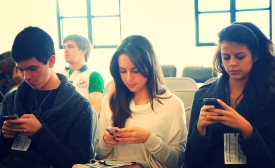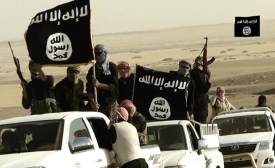social media
Human Rights First and French NGO Coexister convened the #BetterTogether Inaugural Summit in Paris last month to address the problem of hate speech on the Internet and in social networks. The two-day meeting brought together civil society actors, technology companies, and French and American government representatives for sessions dedicated to the creation of coalitions and advocacy campaigns...
Undersecretary of State for Public Diplomacy and Public Affairs Richard Stengel discussed the Islamic State’s influential social media presence and how the U.S. can counter it on campus Thursday. The 90-minute discussion [...] focused on the work of the Global Engagement Center (GEC), a State Department anti-extremism initiative, which Stengel oversees.
Social media has empowered isis recruiting, helping the group draw at least 30,000 foreign fighters, from some 100 countries, to the battlefields of Syria and Iraq. It has aided the seeding of new franchises in places ranging from Libya and Afghanistan to Nigeria and Bangladesh. It was the vehicle isis used to declare war on the United States...

From @Argentina to @Uruguay, states are discovering that their English-language Twitter handles let them join the digital discussion.
Foreign Minister Retno Marsudi has emphasized the importance of social media as a tool for diplomats to obtain timely information and to represent Indonesia abroad. "It is impossible for diplomats not to take advantage of social media in this [digital] era," Retno said in her opening speech at the Kompasianival event in South Jakarta on Saturday (08/10).
Social media is, of course, not the sole, or even the most important, cause of this failure. But we argue that social media challenges democratic consolidation by accelerating and intensifying dangerous trends such as polarization, fear and dehumanization of rivals. The speed, emotional intensity and echo-chamber qualities of social media content make those exposed to it experience more extreme reactions.
Egypt’s 2011 uprising has become synonymous with the successful use of social media to overthrow an entrenched authoritarian regime. Popular and academic literature hold it up as the paradigm of social media’s effects on contentious politics. Activists from Bahrain and Turkey to Ukraine and St. Louis learned and applied Egyptian protest tactics.

Challenging ISIS has little to do with decreasing their number of Twitter followers.







